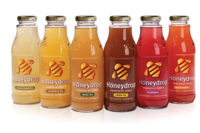Ingredient Spotlight: Coffee's buzz continues to grow
Once considered a pick-me-up drink livened by only cream or sugar, coffee has become a business driven by a plethora of origins, flavors and custom creations. Instead of plain coffee, 18- to 35-year-old consumers have embraced creamy coffee-based beverages, says Walter Crawley, director of business development and marketing for Kerry Ingredients & Flavours, Clark, N.J.
In the category, trends often start in coffee shops and foodservice locations, where the menu can be dominated by creamy, indulgent beverages. McDonald’s, Oak Brook, Ill., is planning a summer push to promote its frozen coffee-based Frappes line. The restaurant chain is hoping the Frappes, along with other offerings, will help McDonald’s become a beverage destination, reports say.
Customization also is important to coffee consumers. In April, Starbucks Coffee, Seattle, re-launched its blended Frappuccino platform allowing for “however-you-want-it” beverages. Starbucks said there are thousands of possible combinations between options for coffee strength, milk choices, syrups and toppings for its Frappuccinos.
The trend in foodservice has led to expansion of ready-to-drink (RTD) coffee beverages at retail. RTD coffee has experienced double-digit growth and is projected to continue, says Noreen Carroll, director of food ingredient sales for Autocrat Inc., Lincoln, R.I.
In January, Starbucks subsidiary Seattle’s Best Coffee introduced a line of RTD iced latte coffee drinks. The launch included Iced Latte, Iced Vanilla Latte and Iced Mocha flavors in retail outlets in the west through the North American Coffee Partnership, a joint venture between Starbucks and Pepsi-Cola North American Beverages. The RTD launch is part of Starbucks’ expansion plans for the brand, the company says.
The expansion of RTD iced cappuccinos also was noted by Autocrat’s Carroll. RTD iced coffees call for a specific type of extract application, Carroll says.
“These products use espresso-type extracts that have a slightly darker roast and are versatile in basic coffee but also can have other flavors like hazelnut and French vanilla for line extensions,” she says.
Autocrat has more than 1,000 formulas for coffee extracts, many of which can be customized for specific applications, Carroll says.
Kerry sources green coffee beans and roasts the beans to meet the specification, grind and extract to create its high-quality, shelf-stable coffee extracts, he says. In addition, Kerry offers X Café, a shelf-stable liquid coffee available for foodservice and ingredient use. The company also offers premium coffee extracts as well as flavors designed specifically for coffee, Crawley says.
The company offers a line of standard extracts, such as Colombian Medium Roast, Colombian Dark Roast, Sumatra Blend, 100 percent Sumatra and Espresso Roast. Kerry also can produce custom extracts for a desired flavor profile as well as works with a customer’s bean supply for a solution specifically suited to a particular project, Crawley explains.
Another trend in the category is the move toward coffee-based energy drinks, Crawley notes. Whynatte Enterprises, Atlanta, combines coffee, milk, ginseng and guarana seed extract for its Whynatte Latte. Last year, Monster Beverage Co., Corona, Calif., added X-Presso to its coffee-infused energy drink offerings, which includes the line of Java Monster energy drinks. X-Presso is made in Holland and imported into the United States. The beverage includes Monster’s energy blend and is produced with nitrous oxide to achieve an espresso with creamy foam similar to European coffeehouse offerings, the company says.
In addition to its natural caffeine, coffee beverages also are sought after for their antioxidant benefits, Autocrat’s Carroll says. To boost natural antioxidants, Roll International created a PomX Iced Coffee line in three varieties that combine coffee with its PomX Antioxidant Super Extract. The line is available in 10.5-ounce bottles in the refrigerated section of the produce department in Chocolate, Café au Lait and Vanilla flavors.
Organic and Fair Trade continue to be popular niche trends in the coffee category. Kerry’s Crawley has seen consistent demand in ingredients carrying the respective certifications.
For customers of Autocrat’s organic and Fair Trade ingredients, their product must carry certification to support the company’s mission, which is more important than the ingredient’s higher price tag, Carroll says. Autocrat has seen an increased demand for certified ingredients although availability can be of concern occasionally.
The extract market, like the overall coffee supply, can be affected by agricultural issues, Carroll says.
“Since coffee is a commodity, it is very challenging to keep flavor and quality consistent when dealing with a crop that can vary year to year,” Carroll says. “Our team has the technical experience as trained coffee specialists, ‘coffee cuppers,’ to formulate how to overcome the challenges with the coffee commodity.”
At Kerry, customers can leverage not only its coffee supply, but the company’s wide variety of beverage ingredients and flavors to provide coffee extracts in addition to finished beverage solutions, Crawley says. BI
Related Links:
Ingredient Spotlight: New initiatives expand Starbucks’ reach
News: Beverage sales contribute to McDonald’s April growth
Category Focus: Coffee and RTD coffee innovate to stay competitive
Looking for a reprint of this article?
From high-res PDFs to custom plaques, order your copy today!




